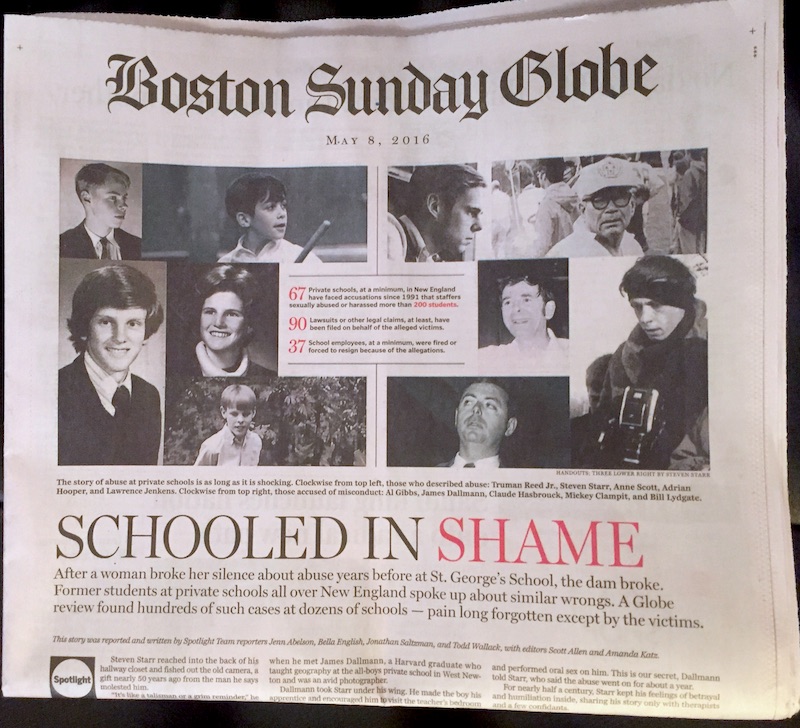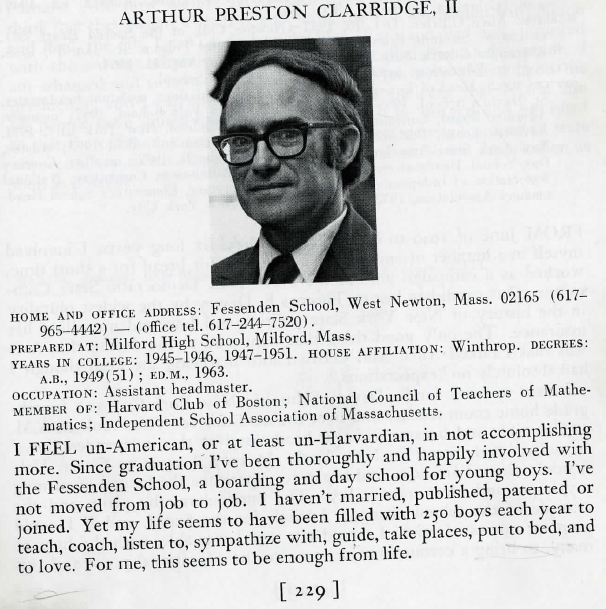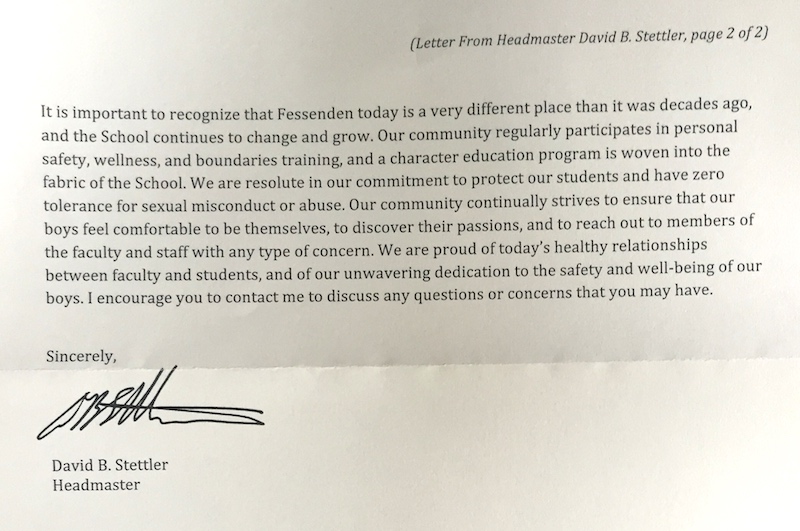
The Boston Globe Spotlight team — the same group of investigative journalists who opened up the decades of abuse and coverups involving the Catholic Church — published a story in this morning’s Boston Sunday Globe that details the horrors and sickness that pervaded the Fessenden School in West Newton as well as many other prep schools across New England.
The response from the prep schools was not surprising: Only 10% responded to a Globe survey about their experiences handling reports of sexual abuse. The schools clearly want this story to go away. They don’t want to deal with the negative publicity, the lawsuits, or the questions about policies relating to screening teachers, reporting abuse to authorities, or helping former students who have been victimized.
Readers of this blog know that 5 years ago the Fessenden school admitted a pattern of “inappropriate sexual behavior” involving faculty and staff that started in the 1960s and extended right through to the 2000s. The 2011 letter named one faculty member, Arthur Clarridge, who along with another named James Dallmann, were arrested in 1977 for crimes against children that took place outside of campus, and suggested that Clarridge may have abused a student. No other names of abusers were revealed in the 2011 letter by current headmaster David Stettler. The comments at the end of my 2011 blog post detailed not only names, but claims that inappropriate sexual behavior took place over a much longer period of time (one former student indicated it started as early as the 1940s) and involved many more staff and faculty members.
Several victims of the abuse at Fessy were brave enough to step forward and tell the painful and explicit details of the sexual assaults. The Spotlight article added two more faculty names to the roster:
Of the 17 total alleged [Fessenden] victims, four settled claims, nine continue to pursue them, and four filed no claims, according to a school spokesman. The accused former employees include assistant headmaster Arthur Clarridge, teachers James Dallmann and Claude Hasbrouck, and school psychologist Mickey Clampit.
Clarridge made no secret of his preferences. This is the update he sent his Harvard classmates sometime in the 1960s or 1970s, when he was at Fessenden:

The Globe Spotlight report included one former student’s descriptions of Hasbrouck’s Nazi paraphernalia and sexual abuse. Hasbrouck died in 1997.
As for Clampit:
Two other former Fessenden students told the Globe that Clampit abused them, too. One, who said Clampit fondled him at school and on a trip to Arkansas and Mexico, sent the school a letter demanding compensation for the abuse through attorney Mitchell Garabedian in 2015. The other man, who settled a claim against Fessenden in the 1990s, said Clampit was among four people there who abused him.
Clampit, who left Fessenden in 1976 and whose license to practice psychology in Massachusetts expired in 1996, could not be reached for comment at any of his known addresses or through his family. But his niece, Michelle Clampit of Los Angeles, said she never heard such accusations about him and was puzzled why they were surfacing now.
Note that Clampit was responsible for screening incoming students in private and counseling existing students if they reported abuse or other problems. Think about that for a moment. Fessenden’s gatekeeper and guidance counselor — the trusted adult a confused or abused student might turn to after encountering Clarridge, Dallmann, or Hasbrouck — was himself a child predator, according to several former students.
I would like to add a correction here to the Spotlight Team: Clampit did not leave in 1976. He was still at the school in the early 1980s. I know this because he screened me in 1979 or 1980 at his office in one of the upper-story dormers in the administration building and one of the commenters on the other blog post who worked at Fessenden from 1979 to 1986 said she and her colleagues knew of Clampit his behavior:
Does anyone out there remember Mr. Mickey Clampitt? He was the school psychologist/test administrator, and lived in an apartment on campus next to the “learning center.” He would hand out “creepie crawlies” (!) , little plastic bugs, to boys and would proceed to “tickle” the boys with them. The boys would squirm and giggle as Mickey, obviously enjoying the whole affair, held the boys close to his body. Well, you get the picture. Not exactly rape, but clearly NOT OK., and possibly the tip of the proverbial iceberg…as is obvious from reading this blog.
The 2016 Fessenden Letter
Just before the Spotlight article came out, Stettler sent another letter to alumni, dated May 5, 2016 (see below). Like the 2011 letter, it was timed to blunt the shock of the negative news coming from the media (although the headmaster claims in his latest letter that the 2011 information was “proactively shared”). The 2016 letter says “the School has received reports of sexual abuse involving at least 16 former students and one non-student by at least 5 individuals who were members of our community.”
Note that the 2016 Fessenden letter acknowledges “at least” 5 individuals, but the Spotlight report only names 4. Who is that fifth person? [see update, below]
The letter goes on to say that instances of abuse were reported to the school’s administration in the 1960s and 1970s but the school “according to these alumni, failed to take appropriate action.”
The school’s latest response? A symbolic one. “The school has removed the name of Robert F. Coffin, headmaster from 1967 to 1980, from the Fessenden ice rink,” Stettler wrote.
If you’re shaking your head in disbelief, I don’t blame you. Fessenden’s headmaster has tacitly admitted there was a nest of pedophiles at the school, and the school’s response is to remove a long-dead headmaster’s name from the hockey rink.
It’s absolutely pathetic and infuriating.
Why hasn’t Fessenden been investigated?
As you digest this information, there are several important facts to keep in mind:
- Not one Fessenden faculty member or staffer has ever been charged with abuse of a Fessenden student.
- Not one Fessenden administrator or trustee — from the 1960s to the current timeframe — has been fined or charged for failing to notify local or state authorities of abuse, as required by law.
- Because the people who reportedly committed abuse against Fessenden students were never charged with a crime, they were potentially able to move on to other schools or professions or neighborhoods and commit more vile acts against other innocent children.
I raised this question in my original blog post in 2011, and I will raise it again here:
Why hasn’t Fessenden reported incidents involving sexual abuse or assault of children to the police and DAs office, not just to satisfy the minimum “required documentation” rules, but to help authorities prosecute anyone who has broken the law?
I welcome your comments below.
A note about comments: Under Section 230 of the Communications Decency Act, the author of this blog and the hosting service are not liable for comments left by readers. Per the Digital Media Law Project, “Immunity covers defamation and privacy claims, as well as negligence and other tort claims associated with publication.”
May 28, 2021 Update: The 2016 Fessenden letter to alumni and parents from former Fessenden headmaster David Stettler referenced “five individuals who were members of our community” who were associated with reported sexual abuse of students in the 1960s and 1970s. The Globe Spotlight report named four of them – Clarridge, Dallmann, Hasbrouck, and Clampit. It’s not clear who the fifth person was, but a March 9, 2017 article in the Berkshire Record, “Berkshire School counselor accused of past sexual abuse” (archive) notes that a Fessenden alumnus had accused former Fessenden faculty member Dary Dunham of sexual abuse in the early 1970s:
A former student of Dary Dunham’s, a current faculty member at the Berkshire School, has come forward with allegations that Dunham sexually abused him back in 1971.
The abuse is alleged to have taken place at the Fessenden School in West Newton, where Dunham was a teacher and coach, while the student-victim [redacted] was just 14.
Dunham resigned from the Berkshire School after these allegations went public. However, after working at Fessenden, and prior to working at the Berkshire School, Dunham was also employed as headmaster of Indian Mountain School in the 1990s and early 2000s. According to Connecticut investigators, Dunham impeded a separate investigation into sexual abuse of students at Indian Mountain School in the 1970s and 1980s. The report in the July 22, 1995 Hartford Courant (archive) makes Indian Mountain sound very much like the environment at Fessenden, where teachers were able to groom and abuse young victims, and administrators actively worked to keep investigators away from campus.
Note that Dunham was also headmaster at Indian Mountain when the school hired a teacher named Robert Stephen Phillips, Jr., who worked at prep schools and youth groups across the country. According to Cheshire Academy in Cheshire, Connecticut, and Derby Academy, in Hingham, Massachusetts, Phillips engaged in “sexual misconduct” of students while employed at both schools. He has never been charged with any crime, and as recently as 2019 was still working with children, according to a former victim who has documented Steve Phillips’ career.
PLEASE SHARE THIS POST VIA FACEBOOK, LINKEDIN, TWITTER, OR EMAIL!
Fessenden’s 2016 letter:





